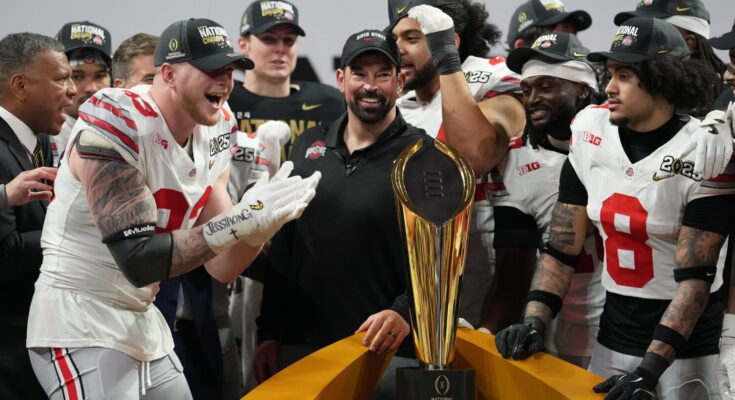Conquering the Best to Be the Best: Why Beating Four of the Nation’s Top Seven Teams in a Brutal Playoff Gauntlet Rightfully Crowns You a National Champion.
Beating four of the nation’s top seven teams in a single playoff run isn’t just impressive—it’s the kind of feat that defines champions. It’s not luck, not timing, not the benefit of a weak schedule or a fluke bounce. It’s a test of endurance, resilience, talent, and execution under pressure, repeated week after week against the absolute best the sport has to offer. Anyone who comes out the other side of such a gauntlet doesn’t need a poll, a panel, or a computer algorithm to validate their place at the top. That team is a national champion. Full stop.
In today’s college football landscape, the definition of a “true” national champion often sparks heated debates. From traditionalists who pine for the old bowl system to fans who only trust a playoff to decide it on the field, everyone has an opinion. But strip away the noise, and a universal truth emerges: the most deserving team is the one that survives and conquers the toughest path. And if that path includes taking down four of the top seven ranked programs in the country, no further evidence is needed.
Think about the mental and physical toll that comes with such a playoff journey. Each game is essentially a national title bout in its own right. Every opponent is elite—well-coached, stacked with talent, and just as hungry. These aren’t mid-tier matchups or lopsided blowouts. These are prime-time, heavyweight clashes. The margin for error is razor-thin, and every mistake is magnified. To not only navigate that minefield but to emerge victorious four times in a row is a level of dominance few teams can even dream of, let alone achieve.
It also speaks volumes about preparation and coaching. Teams that pull this off don’t just rely on raw talent—they adapt, strategize, and adjust on the fly. One week they’re facing a high-octane passing offense. The next, a run-heavy bruising team with a dominant front seven. Then perhaps a balanced squad with a mobile quarterback and an opportunistic defense. To win against that level of diversity requires a complete football program—top to bottom. It demands depth, leadership, in-game adjustments, and an unwavering belief in the system. That kind of run doesn’t happen by accident.
And let’s not forget the pressure. The stakes rise with each game. The spotlight gets hotter. The opponents get stronger. Fatigue sets in. Injuries pile up. The media chatter grows louder. Critics pick apart every weakness, and doubters start circling, waiting for the fall. But a team that can keep its poise and focus across four straight top-tier matchups shows not only physical superiority but mental toughness that defines champions. They don’t just win—they prove, week after week, that they belong at the top.
Detractors may argue that “strength of schedule” or “margin of victory” should play a role in defining greatness. But when a team faces four of the very best and beats them all, those arguments lose weight. The only thing that matters is head-to-head results. Rankings are based on projections, assumptions, and past performance. But the scoreboard doesn’t lie. Beating top teams—actual, proven programs with elite resumes—is the clearest, most objective measure of superiority. It doesn’t require hypotheticals. It’s football settled on the field, the way it’s supposed to be.
There’s also a historical perspective worth considering. In the past, national titles were often awarded based on polls, leading to shared championships or controversy over who was truly number one. A playoff system was created to eliminate that ambiguity—to let teams decide their fate through performance. So when a team goes through the gauntlet and beats four of the top seven, it’s not just about their championship—it’s a validation of the playoff system itself. It’s the realization of the vision: that championships should be earned, not awarded.
Additionally, every one of those top-seven teams a champion beats brings its own narrative, its own momentum, and its own motivation. These aren’t programs that stumble into the postseason—they’re battle-tested and ready. They have five-star recruits, NFL-bound talent, elite coordinators, and a legacy to protect. Taking down one of them is hard enough. Doing it four times in a row is unheard of in most seasons. It’s the stuff of legends, the kind of story that gets passed down in fan lore and program history forever.
Even more impressive is how such a team often improves along the way. It’s not just about surviving; it’s about evolving. The best teams use each playoff win as a stepping stone, correcting flaws, building confidence, and becoming more dangerous with each round. They peak at the right time. Their stars rise to the occasion. Their role players make clutch plays. Their coordinators call masterful games. The synergy grows, and by the end, they’re not just a good team—they’re an unstoppable force.
What also can’t be overlooked is the diversity of challenges they overcome. One week might require a shootout. The next, a defensive slugfest. Then comes a chess match of field position and clock management. Versatility becomes the hallmark of champions. They don’t win the same way every time—they win every way. That’s what beating four top-seven teams reveals: not a one-dimensional juggernaut, but a complete, adaptable, battle-hardened squad that can handle anything thrown its way.
And yet, even with all of this on display, you’ll still find voices trying to diminish the achievement. Maybe it’s a talking head pointing to a close win. Maybe it’s a fan from a rival program griping about officiating. Or maybe it’s someone obsessed with analytics trying to argue that a team that went 2-1 against top opponents and didn’t win its conference is somehow more deserving. But those criticisms fall apart under scrutiny. Because when the trophy is handed out, and you look back at the road traveled, it’s clear: no one had a harder climb. No one faced more giants. No one beat more elite teams in succession. And no one deserves the title more.
The beauty of a playoff gauntlet lies in its purity. It strips away the fluff and exposes what matters most—execution under fire. It’s football at its rawest form. And the team that conquers it doesn’t need to defend its legitimacy. They’ve already proven it—on the field, against the best. They’ve answered every question, silenced every doubt, and overcome every obstacle. If that doesn’t make you a national champion, then nothing ever will.
So the next time a debate arises about who deserves the crown, the resume should speak for itself. Four wins. Four elite opponents. One undefeated playoff run through the sport’s elite. That’s not just worthy of a championship—that is the championship. That’s the pinnacle of college football. That’s what the game was meant to be.
And for the players who fought through it, for the coaches who schemed and adjusted, for the fans who lived every moment with white knuckles and held breath, it’s not just a title. It’s a triumph. A validation. A legacy carved into the annals of history. Because beating four of the nation’s top seven teams in a playoff gauntlet doesn’t just make you a national champion. It makes you unforgettable.



